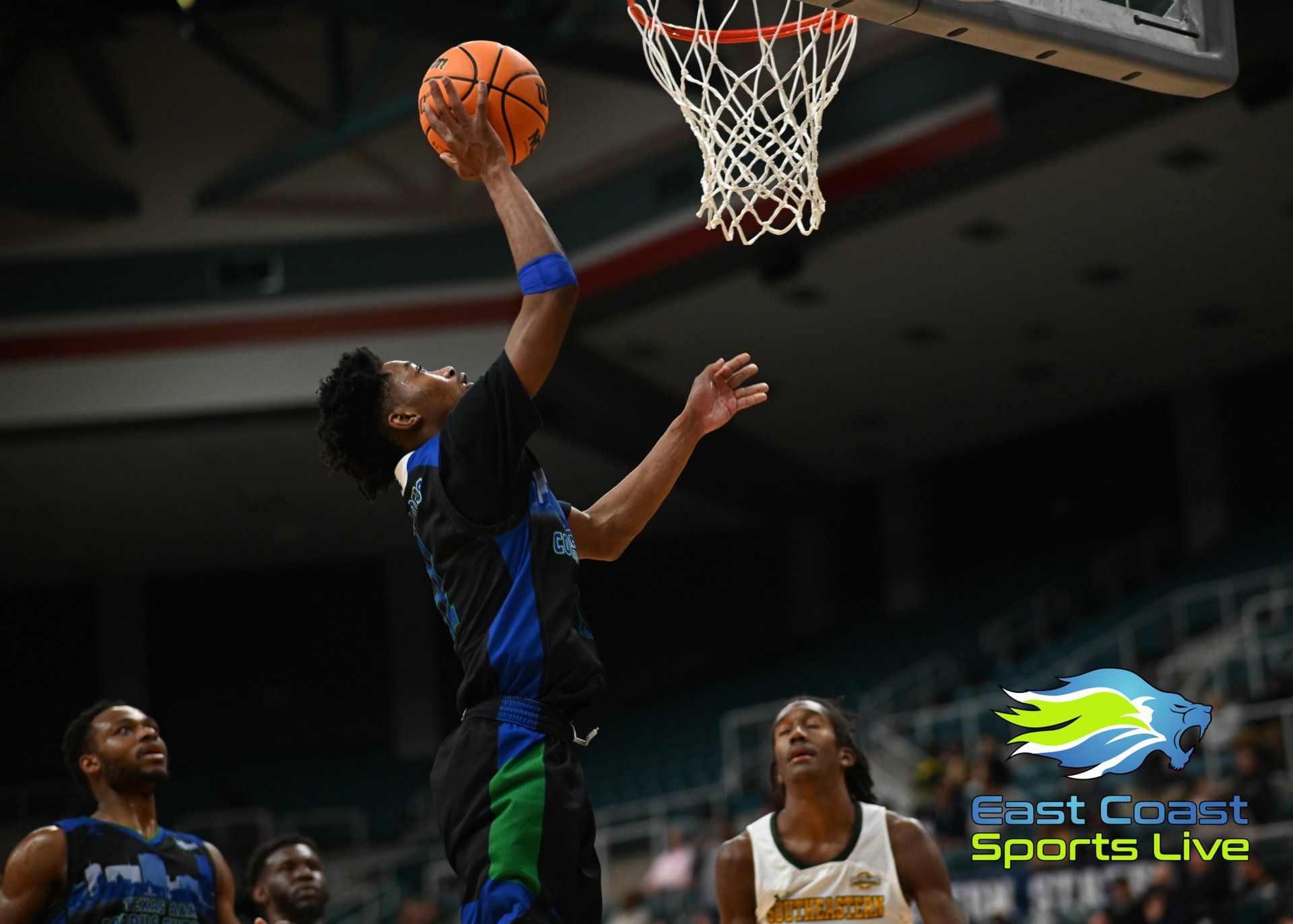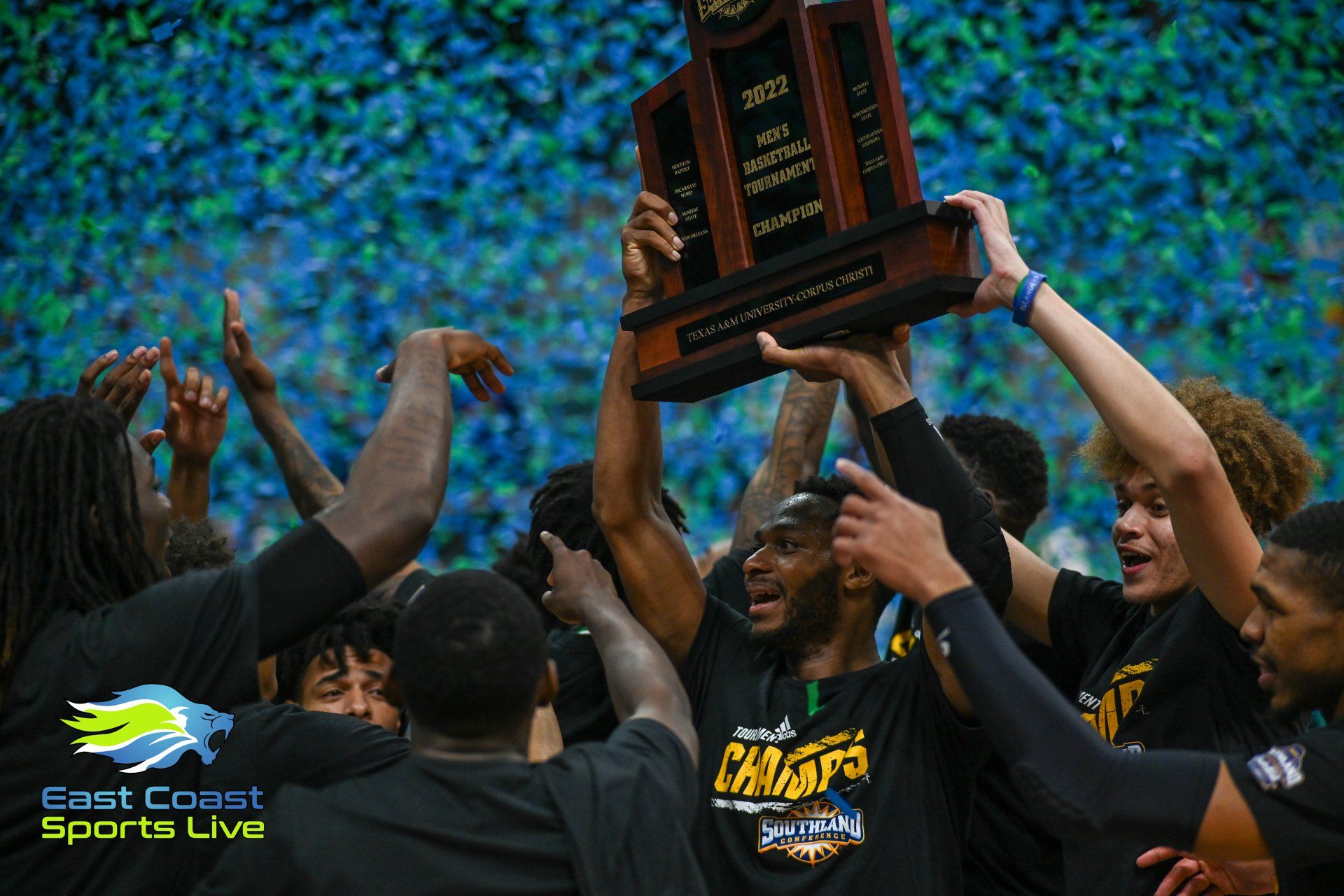East Coast Sports Live
Men's Basketball
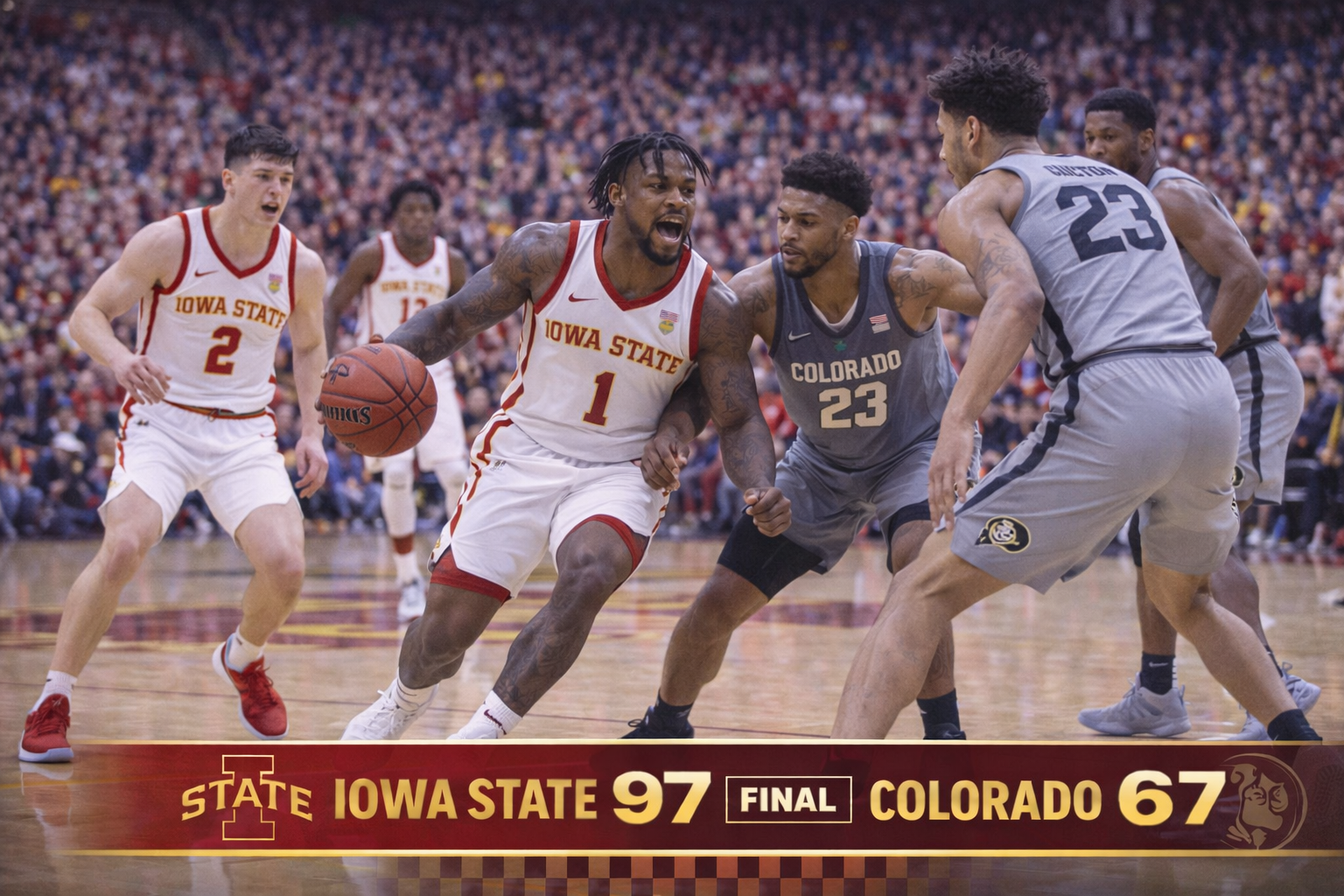
AMES, Iowa — Iowa State turned Thursday night into a runaway almost as soon as the ball went up. Behind a blistering early surge, efficient shooting across the lineup, and major production from its bench, the No. 8 Cyclones rolled past Colorado 97–67 at Hilton Coliseum, overwhelming the Buffaloes with pace and precision from the opening minutes. The win improved Iowa State to 19–2 overall and 6–2 in Big 12 play, while Colorado dropped to 12–9 (2–6 Big 12) and saw its losing streak stretch to six games. For the Cyclones, it was another emphatic home performance in a season filled with them, as Iowa State remained unbeaten in Ames and continued stacking double-digit wins against conference competition. Cyclones’ 30–1 Run Turns the Game Into a Rout Colorado actually struck first. Sebastian Rancik opened the scoring with a three-pointer, briefly giving the Buffaloes an early spark and a moment of optimism. That moment lasted only seconds before Iowa State unleashed one of its most dominant stretches of the season. Over the next six and a half minutes, the Cyclones erupted on a 30–1 run, turning a 3–0 deficit into a 30–4 avalanche that effectively decided the game before the first media timeout stretch was even complete. Iowa State’s opening run was built on everything that has made the Cyclones so difficult to beat this year: rapid ball movement, confident perimeter shooting, and relentless energy on both ends of the floor. The Cyclones buried five three-pointers during the early flurry and finished at the rim when Colorado overextended to protect the arc. Batemon Sparks the Early Explosion Jamarion Batemon, a freshman who was held scoreless in Iowa State’s previous game, became the immediate catalyst. He drilled a three-pointer, then followed with a four-point play on the next possession, a sequence that pushed the tempo even higher and sent Hilton Coliseum into full roar. By the time Tamin Lipsey knocked down a three and Nate Heise finished a dunk, Iowa State was up by 26 just eight minutes into the game. Colorado tried to stop the bleeding with multiple early timeouts, but the Cyclones kept coming, converting high-percentage looks and forcing the Buffaloes into rushed possessions on the other end. Colorado Shows Fight, But Iowa State Keeps Answering To Colorado’s credit, the Buffaloes did not fold completely. After falling into the early hole, they responded with a short burst that showed some fight. Isaiah Johnson, the freshman guard who has emerged as Colorado’s most consistent scorer, sparked a 12–4 Colorado run with aggressive drives and a three-pointer. Barrington Hargress also hit from deep during that stretch, helping Colorado trim the deficit and stabilize the game enough to avoid total freefall. But every time Colorado found a small rhythm, Iowa State answered with another wave. The Cyclones’ depth became a major factor as the game progressed, with fresh bodies rotating in and maintaining the same intensity. By halftime, Iowa State was firmly in control with a 52–29 advantage, posting their second straight 50-point first half and another massive halftime margin at home. Balanced Cyclones Fill the Box Score Batemon led Iowa State with 17 points, providing a huge scoring lift off the bench while hitting four threes. Milan Momcilovic added 16 points, continuing his steady season-long production while also stretching Colorado’s defense with timely perimeter shots. Lipsey finished with 14 points and five assists, directing the offense and keeping Iowa State’s pace under control even while the Cyclones played fast. Joshua Jefferson contributed 13 points, eight rebounds, and five assists, filling the stat sheet and giving Iowa State consistent presence in the paint. Iowa State also received valuable production from freshmen Dominykas Pleta and Killyan Toure, who each scored 12 points, giving the Cyclones six players in double figures. The scoring balance reflected Iowa State’s identity as a team that can overwhelm opponents from multiple spots, especially when it gets early momentum and plays downhill. Second Half Becomes a Showcase of Depth and Efficiency The second half followed the same script. Colorado opened with a couple of strong finishes, including dunks that briefly brought energy back into the Buffaloes’ side, but Iowa State never allowed the margin to drop into a range that felt threatening. Momcilovic buried another three early in the half to stretch the lead, and the Cyclones continued to win possessions with efficiency and rebounding. Iowa State eventually led by as many as 37 points, turning the final 10 minutes into extended rotation minutes and a chance to empty the bench. The Cyclones finished the game shooting 61 percent from the field, their best mark in a conference game in four years. Iowa State also hit 10 three-pointers and consistently created open looks through ball movement and transition opportunities. Numbers That Defined the Blowout Iowa State’s bench was especially decisive, outscoring Colorado’s reserves 40–17, a gap that underscored how Iowa State’s depth wore down the Buffaloes over the course of 40 minutes. Colorado’s biggest bright spot was Johnson, who led all scorers with 24 points, including 15 in the first half. Hargress added 11 points, but Colorado struggled to find consistent production elsewhere, particularly early when Iowa State’s defensive pressure and speed overwhelmed the Buffaloes’ spacing. Colorado also faced major disadvantages in the physical areas of the game. Iowa State won the rebounding battle 33–22, marking the first time this season Colorado had been out-rebounded. The Cyclones also dominated in the paint, outscoring the Buffaloes 46–28 on interior points, repeatedly turning drives and cuts into high-percentage finishes. Final Takeaway For Iowa State, the win was another statement that reinforced its position near the top of the Big 12. The Cyclones have now won by 30 points for the second time in three games, and they continue to stack dominant performances at home with a formula that travels well: defend, rebound, share the ball, and attack in waves. Colorado will look to regroup quickly as it returns home to host TCU, while Iowa State heads back on the road for a matchup at Kansas State. But on Thursday night in Ames, the story was simple. Iowa State landed the first punch, never let up, and turned a conference game into a blowout before Colorado could even settle in.
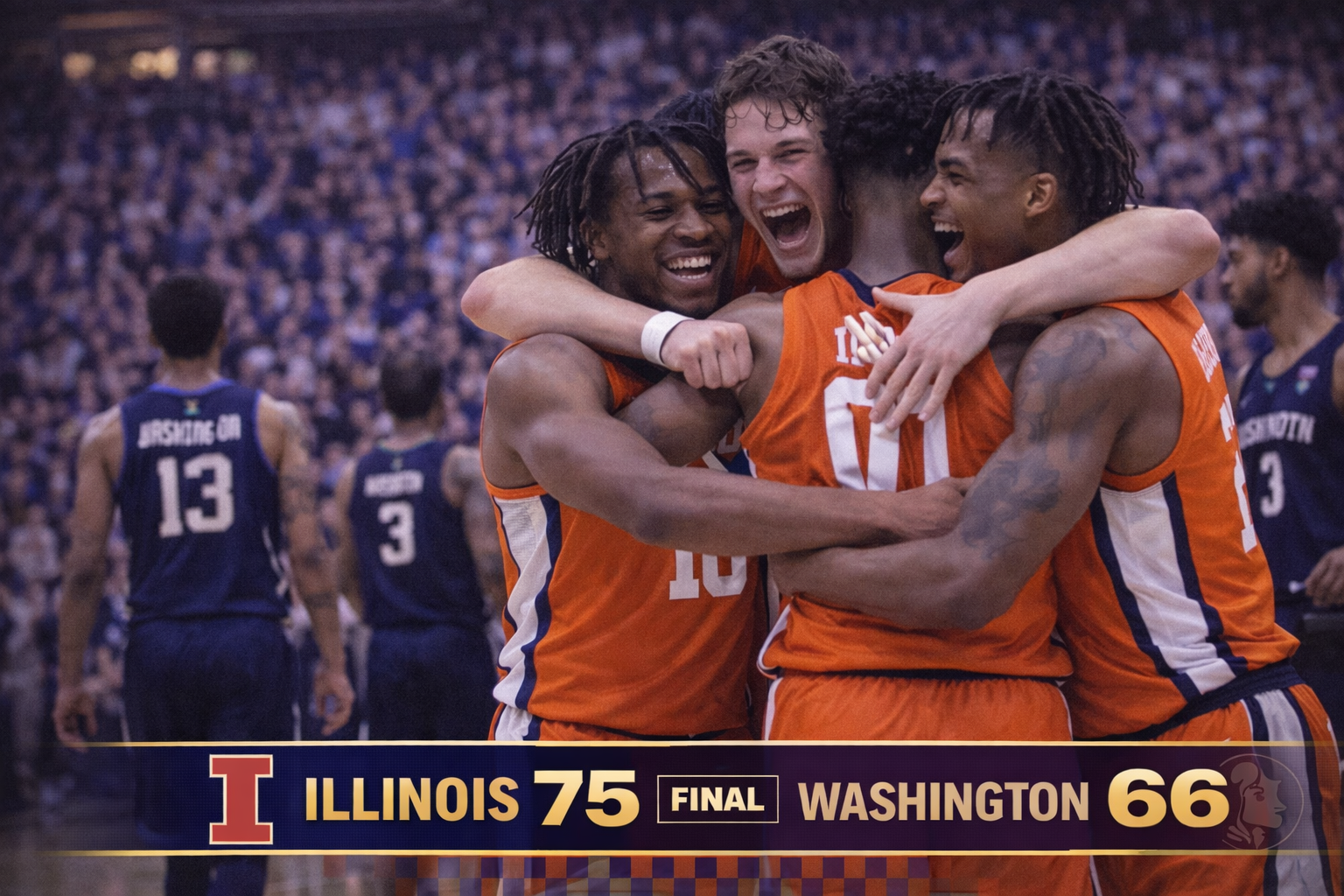
CHAMPAIGN, Ill. — Illinois continues to look every bit like a Big Ten contender, and Thursday night provided another steady reminder of why. Behind a strong all-around performance from freshman star Keaton Wagler and another balanced scoring effort from a deep rotation, No. 9 Illinois defeated Washington 75–66 at a sold-out State Farm Center to extend its winning streak to 10 games, the longest active streak in the conference. The Illini improved to 18–3 overall and 9–1 in Big Ten play, strengthening their position in the league race at the midpoint of conference action. Washington fell to 11–10 (3–7 Big Ten), continuing a challenging stretch of road games against ranked opponents, but the Huskies also left Champaign with signs of progress after competing well into the second half. From the opening minutes, the game followed a familiar Illinois script: survive an early punch, respond with a run, then win the possession battle until the opponent runs out of answers. Washington Strikes First, Illinois Answers Quickly Washington arrived with confidence and opened the game with its best early stretch of the night. The Huskies scored the first seven points, using a quick three-pointer and two strong finishes inside to momentarily seize momentum and quiet the crowd. That start did not rattle Illinois. The Illini responded with a 10–0 run over the next four minutes, flipping the scoreboard and taking control of the game for good. Wagler hit a deep three to ignite the comeback, and Illinois’ pace immediately began to stress Washington’s defense, forcing the Huskies into longer possessions and tougher looks. The opening swing set the tone for the rest of the night. Washington continued to compete, but Illinois’ ability to respond immediately after key Husky baskets prevented the visitors from ever building lasting momentum. Illini Freshmen Set the Pace in the First Half Illinois leaned heavily on its freshman duo early, with Wagler and David Mirkovic combining to score all 16 of Illinois’ points during one stretch in the first half. The two consistently attacked gaps in Washington’s defense, and their composure helped Illinois establish a working margin even when shots were not falling at a high rate. Wagler finished the night with 22 points and eight assists, adding five rebounds and two steals while playing nearly the entire game. His ability to create offense both as a scorer and facilitator was the defining factor, especially during stretches when Washington cut the deficit to a single possession. Mirkovic added 19 points and six rebounds, providing steady offense from multiple spots on the floor. Whether finishing at the rim, hitting jumpers in rhythm, or stepping into open looks from outside, he gave Illinois a reliable second option throughout the night. Illinois led 33–26 at halftime, a margin built on strong shot creation and control of the game’s most important area: extra possessions. Second-Chance Points Separate Illinois While the final score stayed within reach for long stretches, Illinois consistently won the margin that often decides Big Ten games. The Illini dominated second-chance opportunities, turning offensive rebounds into repeated scoring chances and wearing down Washington’s defensive structure. Illinois finished with a 24–4 advantage in second-chance points, a gap that became the most decisive statistical difference in the game. Washington battled on the glass overall, but Illinois’ ability to extend possessions repeatedly created pressure the Huskies could not overcome for 40 minutes. Even when Washington defended well initially, Illinois found ways to keep plays alive. Those extra possessions often led to timely threes, and the Illini’s perimeter shooting served as a backbreaker whenever Washington threatened to make a push. Illinois hit 11 three-pointers, continuing a trend that has defined its offensive identity. The Illini have now made at least 10 threes in seven straight games, and they again used perimeter spacing to open driving lanes and create high-quality looks. Ben Humrichous played a key role in that area, finishing with 14 points and knocking down four threes on six attempts. His late shot-making helped keep Washington from closing the gap in the final minutes. Washington Competes, But Illinois Never Breaks Washington showed resilience after the early deficit and repeatedly cut the margin down to a manageable number. The Huskies pulled within three in the first half and got as close as five several times in the second, but Illinois consistently answered with either a three-pointer or a strong finish at the rim. Hannes Steinbach led Washington with 15 points and 12 rebounds, recording his 13th double-double of the season while adding a career-high four blocks. His presence inside helped Washington win stretches in the paint and gave the Huskies a steady scoring option when possessions slowed down. Wesley Yates III added 13 points, hitting three of five attempts from beyond the arc, and Zoom Diallo posted the first double-double of his career with 12 points and 10 assists. Diallo also grabbed seven rebounds, showing the type of versatility Washington needs as it navigates a difficult conference schedule. The Huskies even outscored Illinois in the paint, but Illinois’ ability to convert second chances and punish mistakes with timely perimeter shooting prevented Washington from ever fully flipping the game. Closing Stretch Shows Illinois’ Poise Illinois did not deliver a single knockout run late, but the Illini played with the control of a veteran team. With the lead hovering in the single digits, Wagler and Humrichous hit critical threes inside the final two minutes to push the margin back into comfortable territory. Wagler’s final three came shortly after Humrichous hit a dagger from the corner, and that one-two sequence ended Washington’s final push. Illinois closed the game by protecting the ball, defending without fouling excessively, and finishing possessions on the glass. Illinois did not shoot its best from the free-throw line, but it made enough plays everywhere else to stay in command, improving to 11–1 at home and continuing one of the strongest starts the program has had in two decades. Final Takeaway Illinois’ 75–66 win over Washington was not its flashiest performance, but it was another example of why the Illini are positioned as a Big Ten title threat. Wagler delivered another complete game, Mirkovic provided steady scoring support, and Illinois once again won the possession battle with relentless offensive rebounding and second-chance production. Washington competed with energy and had multiple players produce strong individual performances, but Illinois’ ability to respond to every run and control the game’s margins made the difference. With the Illini now riding a 10-game win streak, their next road test looms large as they prepare for a rematch against No. 5 Nebraska.
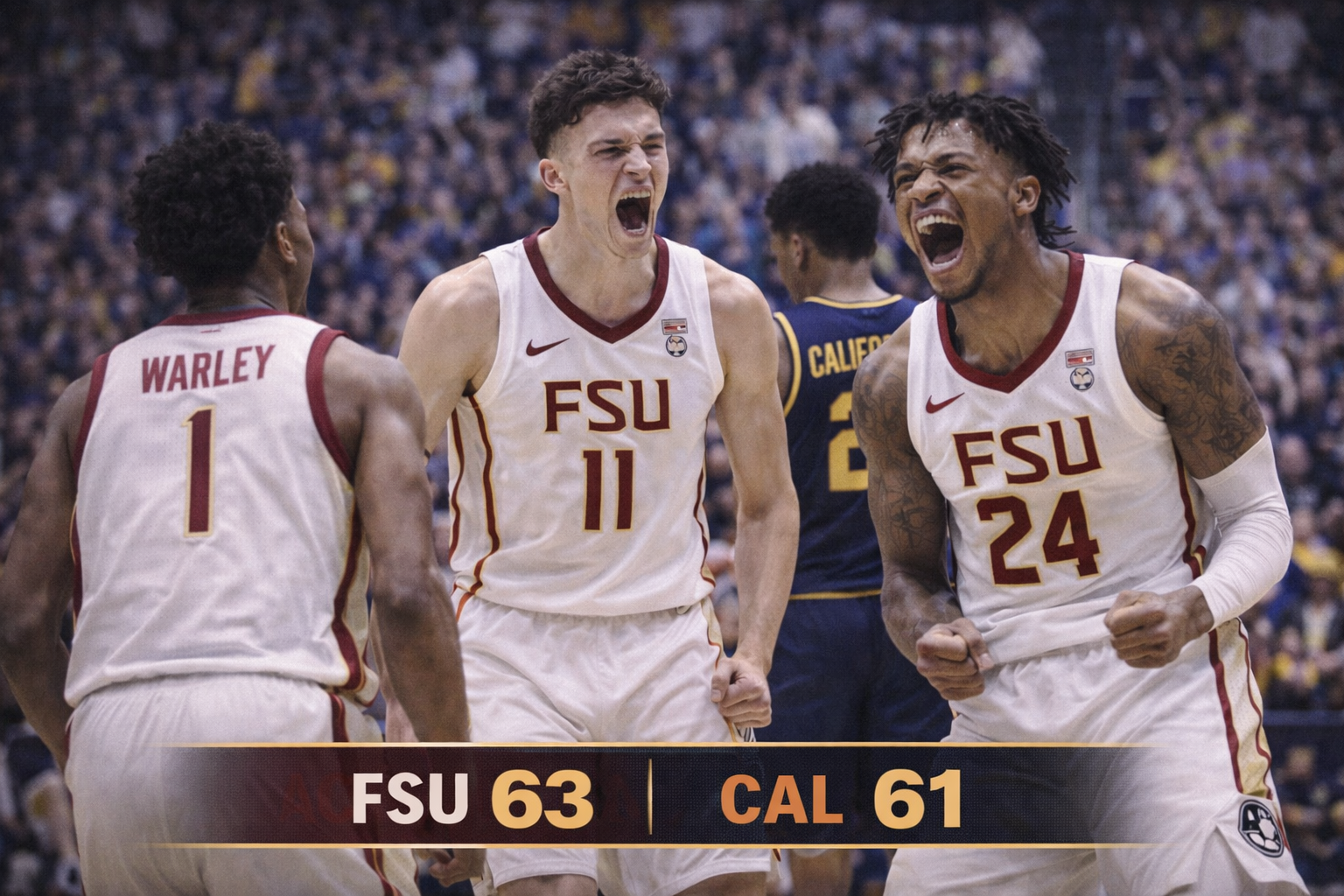
TALLAHASSEE, Fla. — Florida State spent most of Wednesday night in control, then spent the final minutes surviving. The Seminoles built a commanding first-half cushion, absorbed a determined second-half comeback from California, and escaped with a 63–61 victory at the Donald L. Tucker Center in a tightly contested Atlantic Coast Conference matchup. The win moved Florida State to 9–12 overall and 2–6 in ACC play, while California fell to 15–6 (3–5 ACC) after coming up just short in its first-ever trip to Tallahassee. Florida State’s early execution set the foundation. The Seminoles opened with pace, shot-making, and physical play in the paint, using quick offensive bursts to keep California from settling into a rhythm. A game that began with back-and-forth energy soon tilted toward the home team as Florida State strung together the first major run of the night. First-Half Run Gives Seminoles Control Florida State’s start was fueled by perimeter confidence and an aggressive interior approach. The Seminoles hit early three-pointers to establish momentum, and when California responded with its own shooting stretch, Florida State answered with another push that regained control of the tempo. California briefly flashed the offensive balance that has carried it through the season. Dai Dai Ames attacked off the dribble, Justin Pippen knocked down a three, and Chris Bell delivered a pair of deep shots that helped the Bears build a short-lived advantage. But Florida State quickly stabilized, tightening defensively and turning stops into points. The decisive stretch came late in the half. Florida State closed the opening 20 minutes on an 18–4 run, creating separation with improved ball movement, transition opportunities, and consistent paint scoring. By halftime, the Seminoles had opened up a 36–23 lead, holding California to its fewest points in any half this season. Chauncey Wiggins set the tone offensively, scoring 13 of his 18 points in the first half and providing the spacing Florida State needed to attack inside. California’s offense, meanwhile, stalled for long stretches, and the Bears’ inability to generate consistent looks near the rim forced them into contested jumpers. Florida State Pushes Lead to 15, Cal Responds Florida State extended its advantage early in the second half, stretching the margin to 15 points just minutes after the break. A Robert McCray V layup pushed the lead to its largest point of the night and appeared to put the Seminoles in full control. California refused to let the game slip away. The Bears began to chip into the deficit by tightening defensively and finally generating offense through both second chances and timely perimeter shooting. Milos Ilic provided a spark with a putback, and John Camden added a three-pointer as Cal started to find life. Ames continued to apply pressure as a downhill guard, while Pippen’s shooting kept Florida State from fully packing the paint. The Bears gradually carved the deficit into single digits, turning the final 12 minutes into a possession-by-possession fight. Cal’s improved second-half efficiency was noticeable, even if the overall shooting numbers remained modest. The Bears began to win more loose-ball sequences, generated better shot quality, and found momentum at the foul line as Florida State’s early cushion began to shrink. Pippen and Cal Take Late Lead Before Seminoles Answer California’s comeback reached its peak late. With Florida State still clinging to a narrow edge, the Bears produced their best stretch of execution, finally breaking through to take the lead. Pippen delivered one of the defining moments of the night, finishing a crucial sequence that helped California take a 59–58 advantage with 3:45 remaining, its first lead since the early portion of the first half. It was the reward for a relentless comeback that saw the Bears erase a 15-point deficit on the road. But Florida State responded immediately. McCray attacked the rim for a basket that reclaimed the lead, and the Seminoles leaned on their physicality and composure to regain control in the closing possessions. The final minutes became a battle of execution rather than pace. Both teams were forced into half-court possessions, and each defensive stop carried massive weight. Florida State’s ability to stay aggressive in the paint proved critical as the game tightened. Wiggins Delivers the Decisive Shot With the game tied at 60–60, Florida State found its go-ahead basket from its most consistent scorer. Wiggins knocked down a jumper with just under three minutes remaining, putting the Seminoles in front for good and giving the home crowd a final burst of energy. California still had multiple chances to steal the win, but the Bears could not convert late. Cal missed its final four shots, including a potential game-winner from three-point range at the buzzer that fell short. Florida State did not score in the final two-plus minutes either, but it made the defensive plays necessary to protect the lead. Lajae Jones played a major role in the closing sequence, helping secure a critical defensive rebound at the horn that sealed the victory. Florida State Wins the Paint Battle While California hit 10 three-pointers, Florida State won the game where it mattered most: inside. The Seminoles outscored the Bears 32–14 in the paint, a decisive margin that defined the contest and helped Florida State survive despite modest overall shooting. Florida State also received valuable contributions from its bench, which outscored California’s reserves and provided energy during key stretches. AJ Swinton gave the Seminoles an important lift in extended minutes, knocking down two three-pointers and contributing on the glass. McCray finished with 11 points and played a major role in steadying Florida State late, adding playmaking and rim pressure during the most important possessions. Wiggins led all Seminoles with 18 points, shooting efficiently and delivering the game’s defining jumper. For California, Pippen led all scorers with 19 points, including a career-high four made three-pointers. Bell added 13 points, and Ames reached double figures again while continuing his strong ACC play. Ilic provided a significant interior effort, grabbing 11 rebounds in his first start as a Bear. Final Takeaway Florida State’s 63–61 win over California was built on an elite first half and protected by late defensive execution. The Seminoles created separation with a dominant closing stretch before halftime, then withstood a furious second-half comeback that briefly put them behind in the final four minutes. California proved it can compete in difficult ACC road environments and nearly stole the win late, but Florida State’s control in the paint and timely shot-making from Wiggins ultimately made the difference in a game that came down to the final possession.
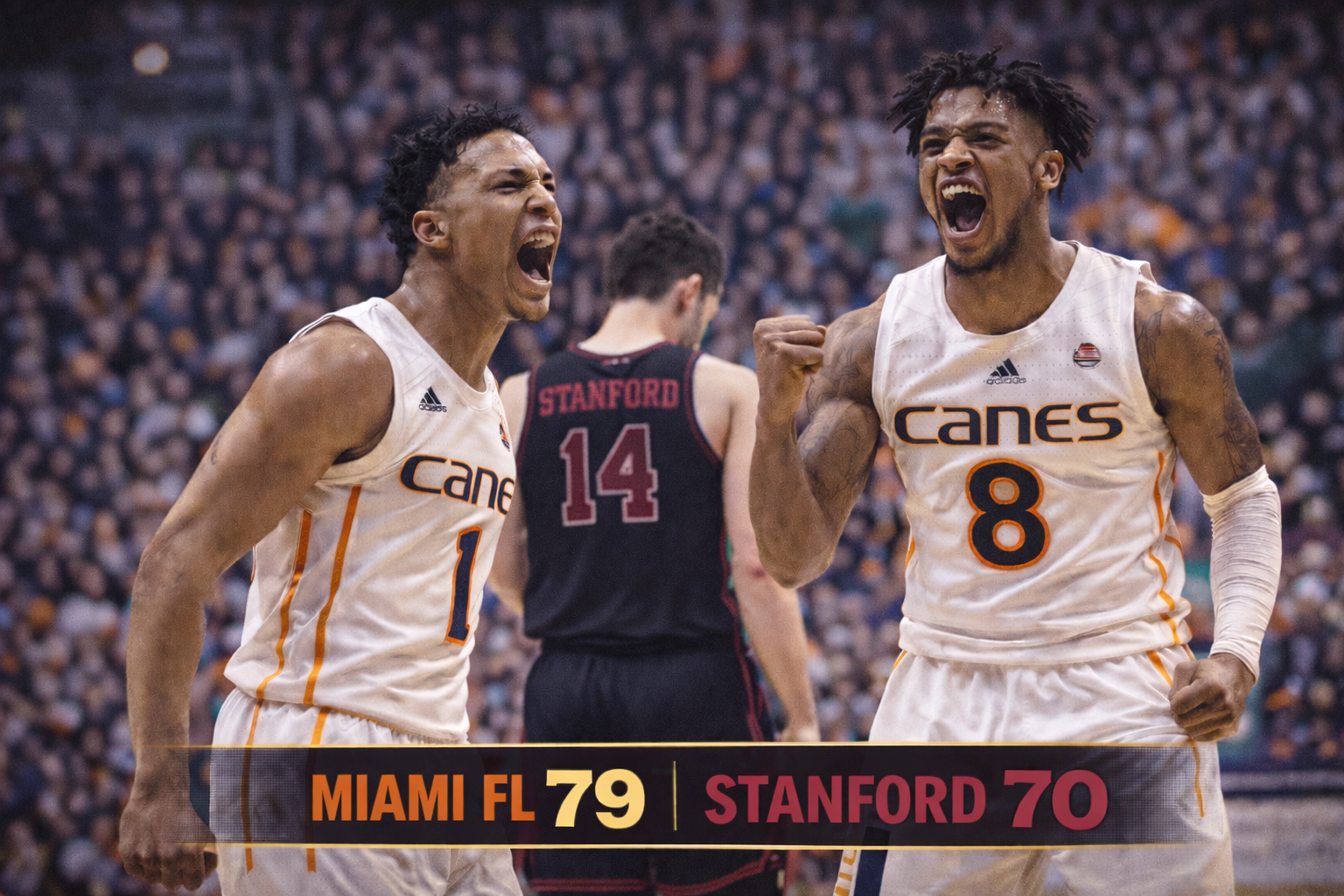
CORAL GABLES, Fla. — Stanford walked into the Watsco Center Wednesday night with momentum still within reach, but Miami’s second-half energy, defensive adjustments, and late-game execution flipped the game in the Hurricanes’ favor. After trailing at halftime and falling behind by as many as nine points in the second half, Miami rallied to defeat Stanford 79–70, using a pair of decisive runs to pull away in the final seven minutes and secure another key Atlantic Coast Conference win. The loss dropped Stanford to 14–7 overall and 3–5 in ACC play, while Miami improved to 17–4 (6–2 ACC) and continued to stabilize after a brief skid earlier this month. For the Cardinal, the result marked another missed opportunity in a league schedule that has offered little margin for error, especially on the road. Miami’s Fast Start Forces Stanford to Settle In Miami came out sharp and aggressive, racing to an 11–2 lead in the opening minutes as guard Tre Donaldson scored seven of the Hurricanes’ first 11 points. The early burst set the tone for the first half, with Miami pushing tempo and forcing Stanford into rushed possessions before the Cardinal offense found its rhythm. The Hurricanes extended the lead to 22–12 with 11:38 remaining in the first half, prompting Stanford to call timeout and regroup. The break proved effective, as Stanford responded with improved ball movement and better shot selection, gradually working its way back into the game. Benny Gealer provided a spark from the perimeter, capping a 7–0 Stanford run with a three-pointer that cut the deficit to a single possession. Ebuka Okorie followed with a personal surge of his own, scoring seven consecutive points to steady Stanford and apply pressure on Miami’s defense. Stanford’s comeback was completed in the closing minutes of the half. A layup from Ryan Agarwal gave the Cardinal its first lead with 1:55 remaining, and Agarwal added a three-pointer just before the break to send Stanford into halftime with a 40–35 advantage. Stanford Builds a Second-Half Lead Before Miami Responds Stanford carried that momentum into the second half and briefly looked poised to take control. The Cardinal stretched its lead to as many as nine points, going up 49–40 with 14:20 remaining. Stanford’s bench also provided a boost, and the Cardinal continued to find success from long range, finishing the night with 11 made three-pointers. Okorie led Stanford with 19 points, adding five rebounds and four assists, while Gealer matched a season-high with 17 points and knocked down a season-best five three-pointers. Agarwal chipped in 11 points and six rebounds, and AJ Rohosy finished with 10 points and four rebounds. Even with Stanford’s scoring balance and strong perimeter production, Miami never allowed the game to slip away. The Hurricanes began to tighten defensively, and the game shifted from Stanford dictating tempo to Miami forcing uncomfortable possessions. Miami’s Defensive Pressure Turns the Game Miami’s comeback was built on a combination of defensive intensity and a clear commitment to winning the paint. The Hurricanes outscored Stanford 38–24 inside, consistently creating high-percentage looks at the rim while limiting Stanford’s ability to finish through contact. A critical stretch arrived midway through the second half. After Stanford still held a narrow lead, Miami launched an 11–2 run to tie the game at 51–51 with 9:35 remaining. Donaldson hit a step-back three during the surge, a shot that not only tied the score but also energized the building and shifted momentum permanently. Miami continued to press, and the Hurricanes regained the lead for good just under six minutes remaining when Tru Washington came up with a steal that led to a fastbreak layup by Dante Allen. That sequence pushed Miami in front 58–56 and signaled that Stanford’s control had slipped. Late Runs Seal the Outcome Stanford remained within reach, but Miami delivered the finishing blows in the final seven minutes. Dante Allen’s three-pointer sparked another decisive 11–2 surge, turning a tight contest into a 67–58 Miami lead with 2:46 remaining. Miami then closed the game from the free-throw line, preventing Stanford from making one last push. Malik Reneau led Miami with 20 points, while Donaldson added 18, continuing to provide steady offensive creation throughout the night. Shelton Henderson finished with 12 points and seven rebounds, including five offensive rebounds, and Washington added 12 points, five rebounds, and four assists off the bench. Miami’s interior defense also played a major role in the closing stretch. Ernest Udeh Jr. grabbed a game-high nine rebounds and recorded three blocks, anchoring the Hurricanes’ ability to finish possessions and limit Stanford’s second chances. Stanford’s late three-point shooting kept the score respectable, as Gealer knocked down multiple triples in the final minutes, but the Cardinal could not string together enough stops to truly threaten. What the Result Means For Miami, the win reinforced its resilience and its ability to win games in multiple ways. The Hurricanes did not shoot perfectly from the perimeter, but they controlled the paint, generated fastbreak chances, and held Stanford to 35.5 percent shooting in the second half, a defensive shift that proved decisive. For Stanford, the loss was another reminder of how quickly ACC road games can turn. The Cardinal played well enough to build a second-half cushion and led at halftime, but turnovers, missed defensive rotations, and Miami’s physicality inside swung the outcome. Stanford will now continue its ACC road trip with a matchup at Florida State, while Miami stays home to host California. Final Takeaway Miami’s 79–70 victory over Stanford was defined by second-half control. Stanford led at halftime and built a nine-point advantage after the break, but Miami’s defensive pressure and ability to win in transition and in the paint turned the game into a Hurricanes showcase over the final 10 minutes. Stanford received strong production from Okorie and Gealer, yet Miami’s balanced scoring and timely runs proved too much to overcome. In a conference race where every road opportunity matters, the Hurricanes took advantage, and the Cardinal left Coral Gables still searching for consistency away from home.
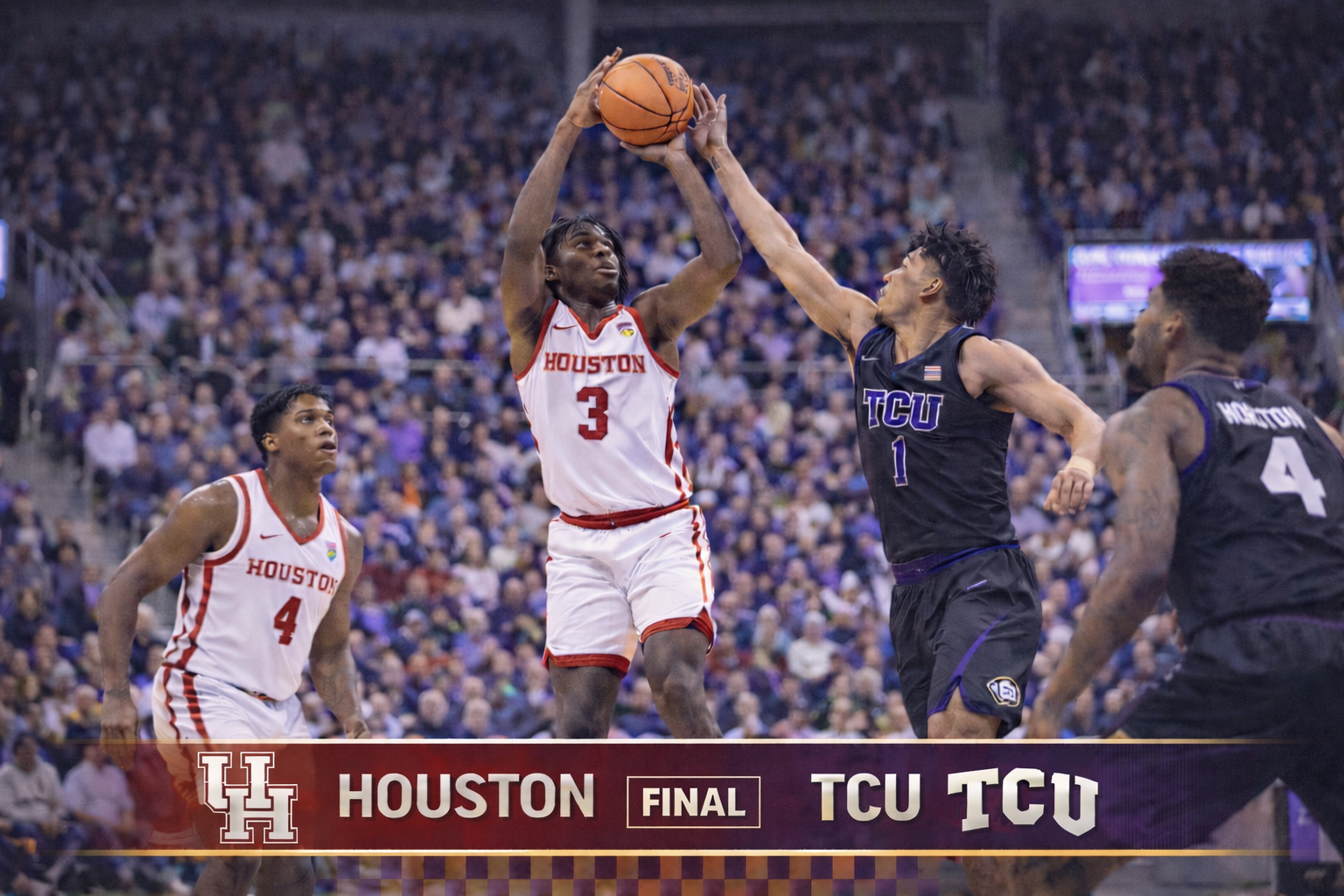
FORT WORTH, Texas — Houston arrived in Fort Worth looking to respond after its first Big 12 setback, and while the Cougars didn’t get an easy night, they got the result they needed. Behind a fast start, timely shot-making, and relentless efficiency at the free-throw line, No. 10 Houston defeated TCU 79–70 on Wednesday night at Schollmaier Arena, surviving a second-half push from the Horned Frogs to secure another important conference road win. The victory improved Houston to 18–2 overall and 6–1 in Big 12 play, while TCU fell to 13–8 (3–5 Big 12) after a strong second half wasn’t enough to erase a first-half deficit created by Houston’s early execution. Houston’s Fast Start Sets the Tone Houston controlled the opening minutes with sharp offensive rhythm and consistent scoring pressure. The Cougars briefly trailed early, but that moment didn’t last long. They quickly settled into their pace, moving the ball cleanly and converting high-percentage looks to build an advantage that would carry through the rest of the night. The Cougars opened the game shooting with confidence and precision, making 16 of their first 22 shots as they built control. While TCU battled defensively, Houston’s ability to convert early opportunities prevented the Horned Frogs from establishing any sustained rhythm. Flemings and Sharp Power the Cougars Offensively Freshman guard Kingston Flemings continued his breakout season with another impactful performance, scoring 27 points to lead Houston and steady the offense through every shift in momentum. After exploding for 42 points in Houston’s previous game at Texas Tech, Flemings again delivered with poise, blending aggressive scoring with smart decision-making in a hostile environment. Senior guard Emanuel Sharp added 23 points, giving Houston a dependable second scoring engine and helping the Cougars maintain separation whenever TCU threatened to tighten the game. Sharp’s production came in key stretches, especially as the game slowed and both defenses began to dictate tougher possessions. A First-Half Run Creates Separation Midway through the first half, Houston delivered the game’s first major swing. A 12–0 run broke the contest open, turning a close score into a working margin that forced TCU to chase the rest of the night. Houston’s lead reached 28–16 during that stretch, and the Cougars’ offense looked comfortable operating both inside and out as they continued to punish defensive breakdowns. Even as TCU tried to settle into the game, Houston’s early execution created a cushion that would matter later. TCU Stays Alive Behind Its Frontcourt TCU refused to let the game slip away. The Horned Frogs stayed connected through physical play in the paint and strong production from their frontcourt. Xavier Edmonds delivered another standout performance, recording his third straight double-double with 18 points and 10 rebounds, continuing to be one of TCU’s most reliable two-way contributors. David Punch added 16 points while also creating offense for others, finishing with six assists and keeping TCU’s half-court attack organized when the Horned Frogs needed clean possessions. Even as Houston controlled the tempo early, TCU’s ability to respond with efficient offense prevented the margin from becoming overwhelming before halftime. Horned Frogs Flip the Energy After Halftime Houston carried a 13-point lead into the second half, but the game shifted quickly after the break. TCU emerged with far more defensive intensity and began forcing Houston into difficult looks. The Horned Frogs’ defensive improvement was dramatic, holding the Cougars to 28.6 percent shooting in the second half and giving themselves multiple chances to make it a real finish. Offensively, TCU played its best stretch of the game early in the second half. The Horned Frogs opened the period with an 11–2 run, cutting the deficit to 47–41 just five minutes into the half. A three-pointer from Liutauras Lelevicius later trimmed the lead to 51–49, and TCU pulled within two on multiple possessions as the crowd surged and the game tightened into a true Big 12 battle. With just under nine minutes remaining, TCU made it a one-possession game at 56–54, putting Houston under its most significant pressure of the night. At that moment, the Horned Frogs had done nearly everything required to flip the game, using defense, shot-making, and rebounding effort to erase most of the early deficit. Houston’s Free Throws and Composure Finish the Job But Houston responded like a team built to survive these moments. Each time TCU drew close, Houston answered with composure and control, and the free-throw line became the separator. The Cougars finished the night 22-of-24 at the line, including 17-of-19 in the second half, consistently turning late-game possessions into points even when the offense wasn’t flowing. Houston also produced its biggest response of the second half with an 8–0 run that restored breathing room. Ramon Walker Jr. knocked down a three-pointer to spark the push, and Flemings followed with four straight free throws that extended Houston’s lead back to double digits at 64–54 with just over five minutes left. That sequence proved decisive. TCU continued to compete and played with urgency until the final horn, but Houston’s ability to finish possessions, earn trips to the line, and convert under pressure prevented the Horned Frogs from completing the comeback. Rebounding Helps Houston Survive the Second Half Houston’s rebounding presence was also a major factor. Freshman forward/center Chris Cenac Jr. grabbed a career-high 14 rebounds, including five offensive boards, helping Houston win key possession battles even as TCU surged defensively in the second half. For TCU, the loss stung because the path to victory was there. The Horned Frogs shot 64 percent in the second half and outshot Houston overall from the field, but Houston’s free-throw efficiency and early-game control ultimately decided the outcome. The Horned Frogs also narrowly lost the rebounding battle 31–30, a margin that mattered in a game where every extra possession carried weight. Final Takeaway In the end, Houston didn’t win with its cleanest second-half offense, but it won with discipline, toughness, and late-game execution. Against one of the nation’s best defensive teams, TCU proved it can defend at an elite level for long stretches. Houston proved it can survive those stretches and still leave with a road win. TCU will look to bounce back as it heads to Colorado next, while Houston returns home for its next conference matchup as it continues building momentum in the Big 12 race.
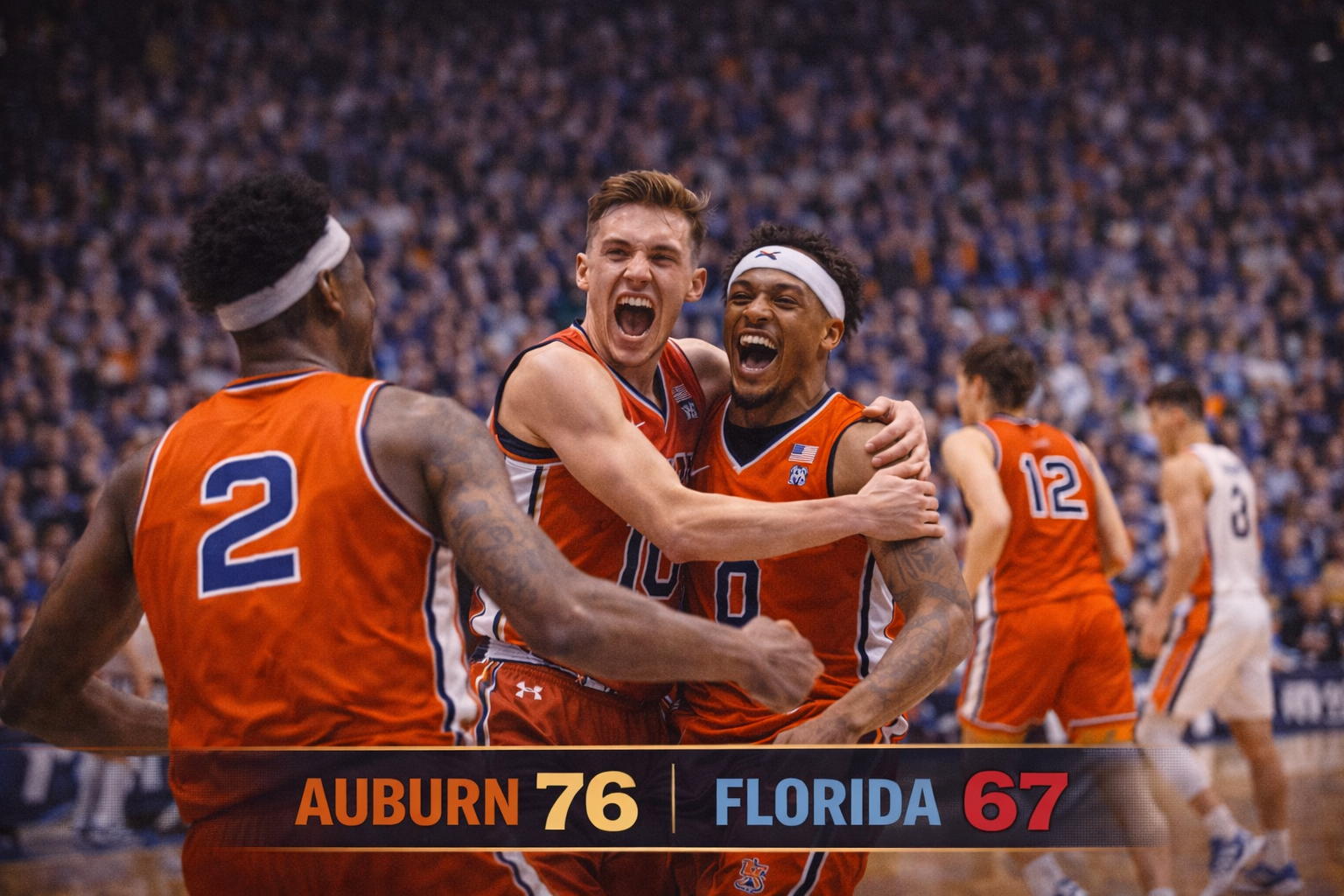
GAINESVILLE, Fla. — Auburn delivered a statement road victory Saturday afternoon, knocking off No. 16 Florida 76–67 at the O’Connell Center and snapping a 30-year winless streak in Gainesville. Powered by a dominant first half, interior physicality, and late-game composure, the Tigers earned one of the most significant road wins in program history and halted Florida’s momentum near the top of the SEC standings. The victory lifted Auburn to 13–7 overall and 4–3 in SEC play, while Florida fell to 14–6 (5–2 SEC) after seeing both its five-game winning streak and 16-game home winning streak come to an abrupt end. The loss marked just Florida’s third home defeat over the past three seasons. Auburn Sets the Tone Early Auburn wasted no time establishing control, opening the game with relentless energy on both ends of the floor. Keyshawn Hall scored Auburn’s first 10 points, immediately putting pressure on Florida’s defense and forcing the Gators into a reactive posture. Within the first four minutes, the Tigers built a double-digit lead, capped by a Tahaad Pettiford three-pointer that made it 10–0. The Tigers continued to push the pace, converting defensive stops into efficient scoring opportunities. A spinning drive by Pettiford capped a 12–0 run and extended Auburn’s lead to 19–5 less than five minutes into the contest. Florida struggled to respond, missing open looks and failing to generate second-chance opportunities as Auburn controlled the glass early. Hall was unstoppable throughout the opening half, scoring 22 points on efficient shooting while mixing perimeter jumpers with strong finishes in the paint. His performance powered Auburn to a commanding 43–28 halftime lead, holding Florida to one of its lowest first-half scoring outputs of the season. Florida Mounts a Second-Half Rally Florida emerged from the locker room with renewed urgency and gradually chipped away at Auburn’s advantage. Thomas Haugh ignited the comeback, scoring in transition and attacking the rim as the Gators increased defensive pressure and tempo. The rally reached its peak when Florida erased the entire deficit, tying the game at 56–56 with just over eight minutes remaining. The O’Connell Center erupted as the Gators appeared poised to seize momentum for the first time since the opening minutes. That moment, however, proved fleeting. Auburn Responds With Poise Rather than folding under pressure, Auburn responded with composure and execution. Pettiford halted Florida’s surge with a jumper in the lane, restoring the lead and settling the Tigers. Kevin Overton followed with a timely basket moments later, pushing Auburn back in front for good. A pivotal defensive sequence swung momentum permanently. Florida appeared to take its first lead of the game on a fast-break layup, but the basket was overturned after review. Auburn capitalized immediately, scoring six unanswered points to reclaim control and silence the crowd. From there, Auburn dictated the final minutes. Pettiford added another tough finish, Williams-Adams converted a driving layup, and Overton came up with a steal and score that extended the lead to 68–60 with under two minutes remaining. Free Throws and Interior Control Seal the Win Auburn closed the game with discipline at the free-throw line, converting 19 of 21 attempts overall and a perfect 6-for-6 in the final 70 seconds. The precision prevented Florida from mounting a last-ditch push and underscored Auburn’s growth in late-game situations. The Tigers dominated where it mattered most, outscoring Florida 38–28 in the paint and consistently winning physical battles around the rim. While Florida held a slight edge in total rebounds, Auburn controlled the most impactful possessions, limiting Florida to just four offensive rebounds in the first half and disrupting the Gators’ interior rhythm throughout. Hall finished with 24 points, seven rebounds, and four assists, recording his 11th 20-point game of the season. KeShawn Murphy delivered a near double-double with 16 points and nine rebounds, anchoring Auburn’s interior presence. Pettiford added 11 points and five rebounds, while Overton contributed 10 points and led the team in plus-minus. Florida received a standout effort from Haugh, who posted 27 points and 10 rebounds while carrying much of the offensive load during the comeback attempt. Elsewhere, the Gators struggled, shooting just 37 percent from the field, 26 percent from three-point range, and 59 percent at the free-throw line. What the Result Means The win marked Auburn’s first road victory over Florida since 1996, snapping a 15-game losing streak in Gainesville. It also represented Auburn’s third win over a ranked opponent this season and its first such victory in a true road environment. For Florida, the loss exposed vulnerabilities on offense and at the free-throw line as SEC play tightens. The Gators fell out of first place in the conference standings and now face increased pressure heading into their next road test. Final Takeaway Auburn’s 76–67 victory over Florida was defined by preparation, physicality, and composure. The Tigers built a commanding early lead, absorbed a furious second-half rally, and responded with execution when the game hung in the balance. By ending a 30-year drought in Gainesville, Auburn delivered a performance that may resonate well beyond January as postseason implications begin to take shape.
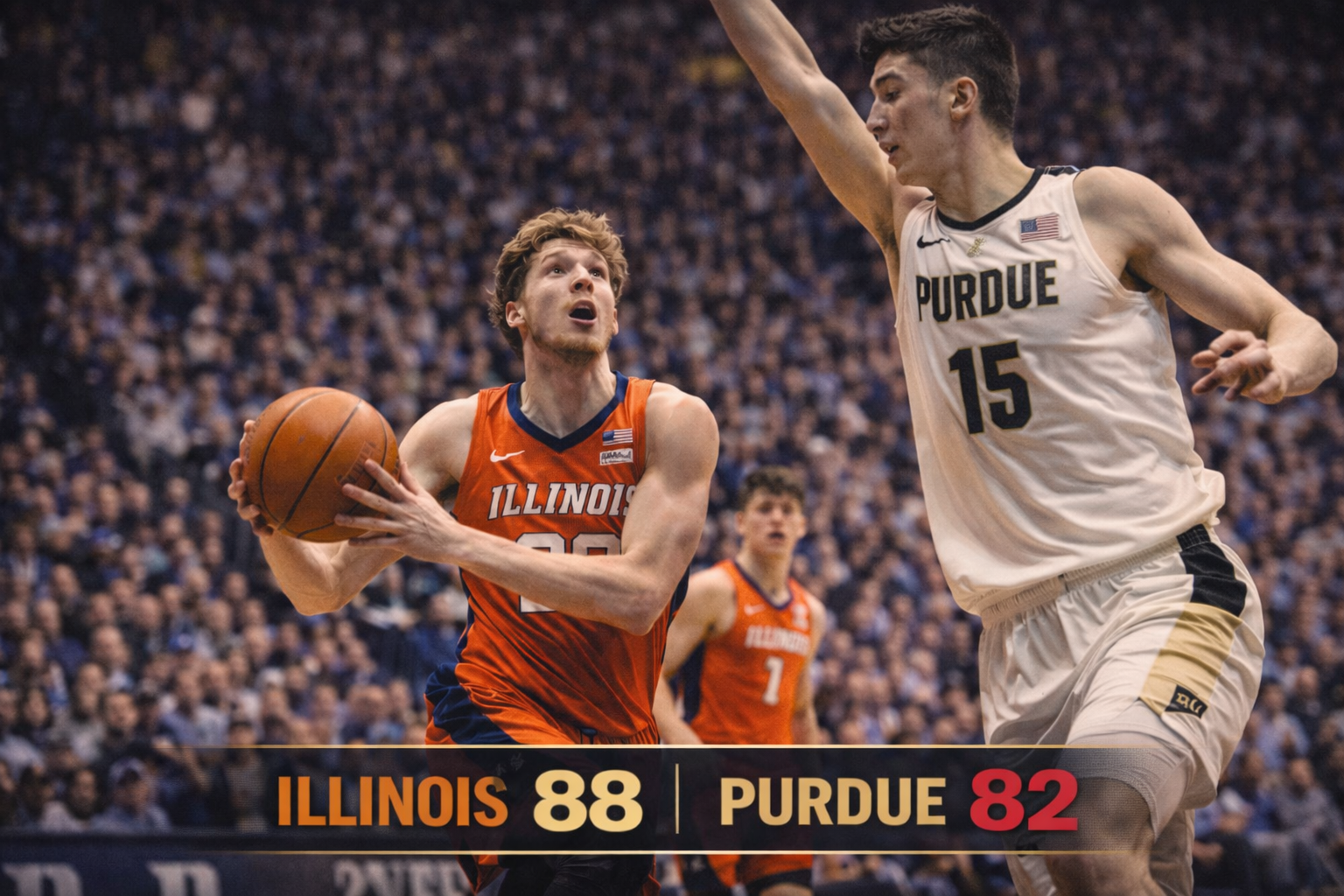
WEST LAFAYETTE, Ind.. — Illinois walked into one of college basketball’s most unforgiving venues and delivered a performance that will be remembered for decades. Behind a historic scoring explosion from freshman Keaton Wagler, the No. 11 Fighting Illini knocked off No. 4 Purdue 88–82 on Saturday afternoon at Mackey Arena, handing the Boilermakers their second straight loss and reshaping the Big Ten title race in the process. Wagler poured in 46 points, setting a school record with nine three-pointers and producing the most points ever scored by a visiting player at Mackey Arena. His performance also marked the most points scored in a road win over a top-10 opponent in AP Poll history, accomplished on one of the sport’s most hostile stages. The win lifted Illinois to 17–3 overall and 8–1 in Big Ten play, keeping the Illini firmly in the conference’s top tier. Purdue fell to 17–3 (7–2 Big Ten) after surrendering late control despite elite offensive efficiency and near-flawless ball security. Purdue Controls Early, Illinois Refuses to Break Purdue came out sharp, executing with precision and building a double-digit lead midway through the first half. The Boilermakers shot better than 60 percent from the field early, with Braden Smith orchestrating the offense and repeatedly finding scoring lanes inside. Illinois struggled defensively during that stretch but never allowed the margin to spiral. Wagler carried the Illini offense almost single-handedly in the opening period, scoring Illinois’ first 14 points and preventing Purdue from creating true separation. Purdue pushed the lead to 35–24 with just under seven minutes remaining, appearing firmly in control. Illinois answered late in the half with timely perimeter shooting, as Wagler and Zvonimir Ivisic each connected from deep in the final minute to trim the deficit. At halftime, Purdue led 43–39, but the momentum had quietly shifted. Illinois had weathered its defensive lapses, Wagler had found a rhythm Purdue could not disrupt, and the rebounding imbalance was beginning to surface. Illinois Seizes Momentum After Halftime Illinois wasted no time flipping the script after the break. Wagler scored the first five points of the second half, and a Jake Davis layup completed a 7–0 run that put Illinois in front for the first time since the opening minutes. From there, the game transformed into a possession-by-possession battle defined by execution and composure. The second half featured 12 lead changes, with neither team leading by more than five points until the closing minute. Purdue continued to score efficiently, but Illinois’ relentless work on the glass applied constant pressure. The Illini dominated the boards, finishing with a 33–19 rebounding advantage, including 13 offensive rebounds that led to 18 second-chance points. Purdue managed just three offensive boards and two second-chance points, an imbalance that loomed larger with each possession. That edge allowed Illinois to survive even when Purdue appeared poised to regain control. Late Execution Delivers the Upset With just over five minutes remaining, Purdue took a 73–68 lead behind a Braden Smith three-pointer and a strong finish at the rim. Mackey Arena roared as the Boilermakers looked ready to close out another home victory. Illinois responded with poise. Tomislav Ivisic buried a three to cap a quick 5–0 run, pulling the Illini even. After a Purdue basket, Illinois struck again—this time with back-to-back three-pointers from Jake Davis and David Mirkovic—pushing the Illini ahead 79–75 inside the final two minutes. Purdue never recovered. Illinois closed the game at the free-throw line while forcing the Boilermakers into difficult late possessions. Mirkovic’s free throws with five seconds remaining sealed one of the most impressive road wins in program history. Wagler Delivers a Performance for the Record Books Wagler’s stat line reflected the magnitude of the moment. He finished 13-of-17 from the field, 9-of-11 from three-point range, and 11-of-13 at the free-throw line, adding four assists while scoring in double figures for the 12th consecutive game. His 46 points tied for the second-most in Illinois history, marked the most ever by an Illini freshman in a Big Ten game, and shattered the program’s single-game three-point record. He also set the Mackey Arena record for points by a visiting player. Purdue threw multiple defensive looks at him, but nothing slowed the freshman. Off the dribble, in transition, or pulling up from deep beyond the arc, Wagler delivered every time Illinois needed a basket. Purdue’s Efficiency Falls Short Purdue played well enough to win on most nights. The Boilermakers shot better than 56 percent from the field, committed just three turnovers, and scored 82 points—numbers that historically guarantee success. Smith led Purdue with 27 points and 12 assists, continuing his climb up the NCAA career assists list. Omer Mayer added 11 points, and Purdue’s offense remained efficient throughout. What Purdue could not overcome was Illinois’ dominance on the glass and Wagler’s historic scoring output. The Boilermakers also struggled to defend the perimeter, allowing Illinois to connect on 18 three-pointers, tying a program record. What the Win Means The victory marked Illinois’ highest-ranked road win since 2021 and extended its winning streak to nine games, the program’s longest under head coach Brad Underwood. Illinois also improved to 5–0 in Big Ten road games, a feat not accomplished since the 2004–05 season. For Purdue, the loss dropped the Boilermakers a game behind Illinois in the conference standings and exposed vulnerabilities on the defensive glass and perimeter as league play intensifies. Final Takeaway Illinois’ 88–82 win at Purdue was not merely an upset—it was a landmark performance driven by one of the greatest individual outings college basketball has seen in years. Keaton Wagler turned Mackey Arena into his personal stage, while Illinois’ rebounding dominance and late-game composure completed a statement victory. Purdue played well. Illinois played historic. In a Big Ten race crowded at the top, Saturday’s result may echo well beyond January.
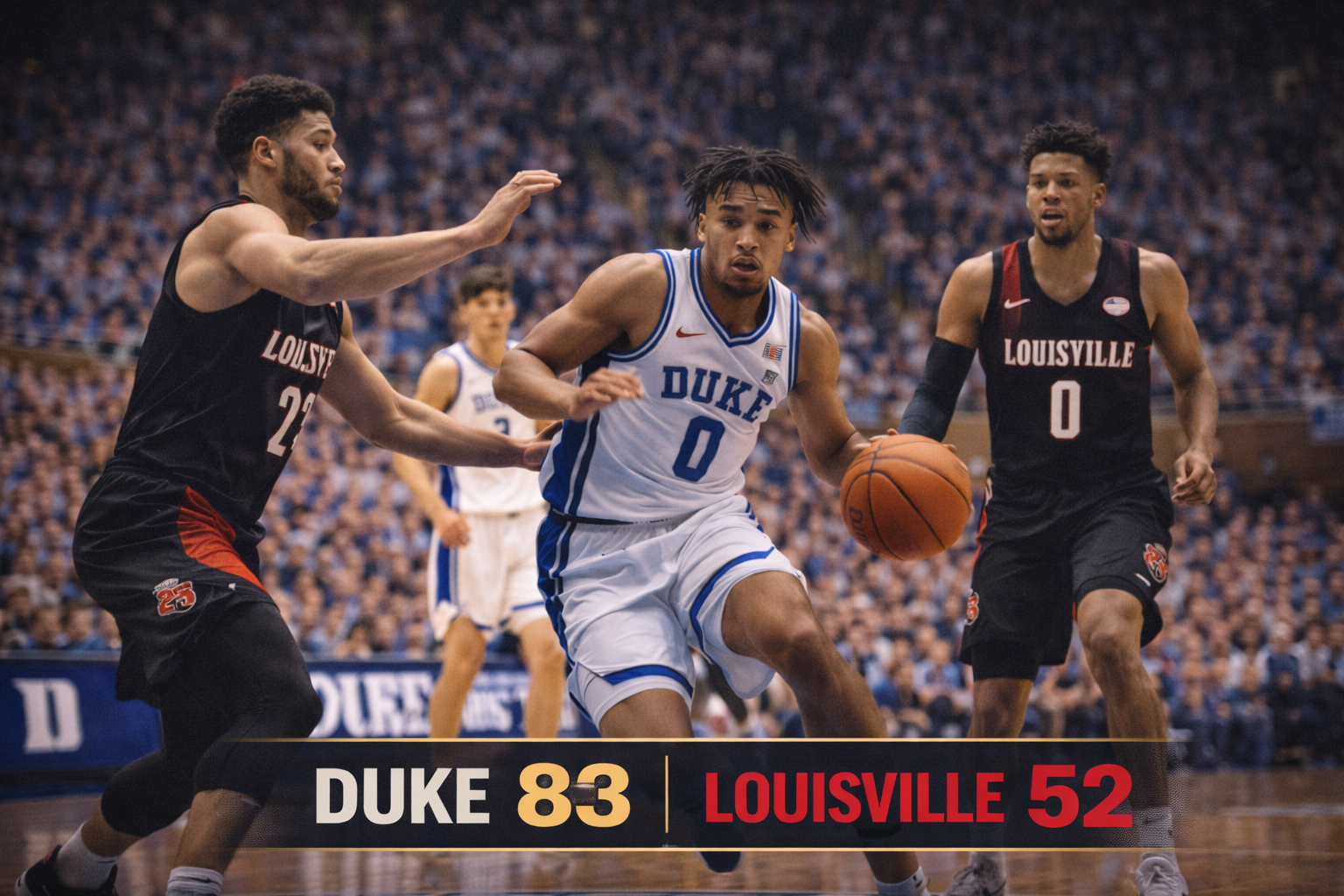
DURHAM, N.C. — Duke delivered one of its most dominant performances of the season Monday night, dismantling No. 20 Louisville 83–52 at Cameron Indoor Stadium in a game that quickly shifted from competitive to one-sided. The Blue Devils controlled the paint, dictated physicality on both ends of the floor, and suffocated Louisville defensively to earn their seventh victory over a ranked opponent this season while improving to 19–1 overall and 8–0 in ACC play. Louisville fell to 14–6 (4–4 ACC) after being held to its lowest scoring output of the year. What began as a tightly contested first half unraveled rapidly once Duke asserted itself late in the opening period and carried that momentum into a devastating second-half stretch. Louisville briefly found confidence midway through the first half, but Duke’s response erased any belief that an upset was brewing. Competitive Opening Gives Way to Duke Control Louisville arrived in Durham with offensive confidence and showed early aggression, trading three-pointers with Duke in the opening minutes. Ryan Conwell and J’Vonne Hadley each connected from deep, and the Cardinals stayed within striking distance as Duke searched for rhythm. Isaiah Evans provided the early spark for the Blue Devils, scoring five quick points to push Duke ahead 8–3. Cameron Boozer followed with assertive finishes in transition, helping Duke establish a working margin while Louisville attempted to counter through perimeter shooting. The game’s tempo slowed as both teams settled into half-court possessions, with Duke maintaining a lead that hovered between two and eight points for much of the half. Louisville briefly seized its lone lead at 25–24 following a fast-break three from Conwell with 4:30 remaining, momentarily energizing the visiting bench. That moment proved fleeting. Duke immediately delivered its most decisive response of the night. Late First-Half Run Breaks the Game Open Duke closed the first half on a 14–3 run, overwhelming Louisville with defensive pressure and interior execution. Patrick Ngongba II sparked the surge, scoring repeatedly around the rim and punishing Cardinal defenders who struggled to hold position. By halftime, Duke had built a 38–28 lead, a margin that reflected more than just scoring. Louisville was already showing signs of strain on the glass and inside the paint, where Duke began asserting clear dominance. The opening half ended with Duke holding advantages in rebounding, shot quality, and defensive consistency, while Louisville’s offense increasingly relied on contested jump shots to stay afloat. Duke’s Second-Half Blitz Leaves No Doubt Any hope of a Louisville response disappeared within the opening minutes of the second half. Ngongba scored Duke’s first 10 points after the break, extending the lead to 48–33 and forcing Louisville into a reactive posture it could not escape. A 16–6 run midway through the half pushed Duke’s advantage beyond 20, highlighted by Nikolas Khamenia’s perimeter shooting and a fast-break dunk that further energized the Cameron Indoor crowd. Duke’s defense tightened even more as the lead grew, limiting Louisville to late-clock attempts and eliminating second-chance opportunities. Khamenia continued the onslaught with a three-pointer and a three-point play, while Boozer capped the surge with a powerful dunk and a contested jumper that stretched the margin to 25 points. From that moment forward, the outcome was no longer in doubt. Duke closed the game by holding Louisville without a made field goal for the final 5:39, finishing off a 31-point victory—the largest margin in the all-time series between the programs. Interior Dominance and Defensive Discipline Define the Night The numbers underscored Duke’s control. The Blue Devils outscored Louisville 42–10 in the paint, outrebounded the Cardinals 47–26, and held a 16–5 edge in second-chance points. Louisville shot just 30 percent from the field and struggled mightily inside, finishing 5-of-21 on two-point attempts. Boozer led Duke with 19 points and 10 rebounds, recording his 10th double-double of the season while also leading the team with four assists. Evans added 15 points, extending his streak of double-figure scoring games to eight. Ngongba also scored 15 points, while Khamenia delivered a career-high 14 points, all coming in the second half. Duke’s guard play proved equally impactful. Defensive pressure from Caleb Foster and Cayden Boozer neutralized Louisville’s backcourt, limiting freshman Mikel Brown Jr. to just seven points on 1-of-13 shooting after he entered the game averaging nearly 17 points per contest. Louisville’s lone consistent scorer was Conwell, who finished with 18 points and four made three-pointers. Hadley added 11 points, but no other Cardinal reached double figures as Duke steadily closed off driving lanes and eliminated offensive rhythm. What the Result Means The victory marked Duke’s best 20-game start under head coach Jon Scheyer and continued a remarkable run at Cameron Indoor Stadium, where the Blue Devils have now won 27 consecutive games. Duke also extended its dominance over Louisville, winning its ninth straight meeting and improving to 30 wins in its last 31 ACC games. For Louisville, the loss served as a stark reminder of the gap that remains against elite competition on the road. The Cardinals had not been outrebounded by more than 10 all season and struggled to match Duke’s physicality and defensive intensity for extended stretches. Final Takeaway Duke’s 83–52 dismantling of Louisville was not the product of hot shooting alone, but a comprehensive performance built on defense, rebounding, and interior dominance. The Blue Devils absorbed Louisville’s early confidence, responded decisively, and turned the game into a rout through discipline and physical execution. Louisville showed flashes early but could not withstand Duke’s sustained pressure. As ACC play continues, the Blue Devils remain firmly entrenched among the nation’s elite, while the Cardinals return home searching for answers after one of their most humbling defeats of the season.
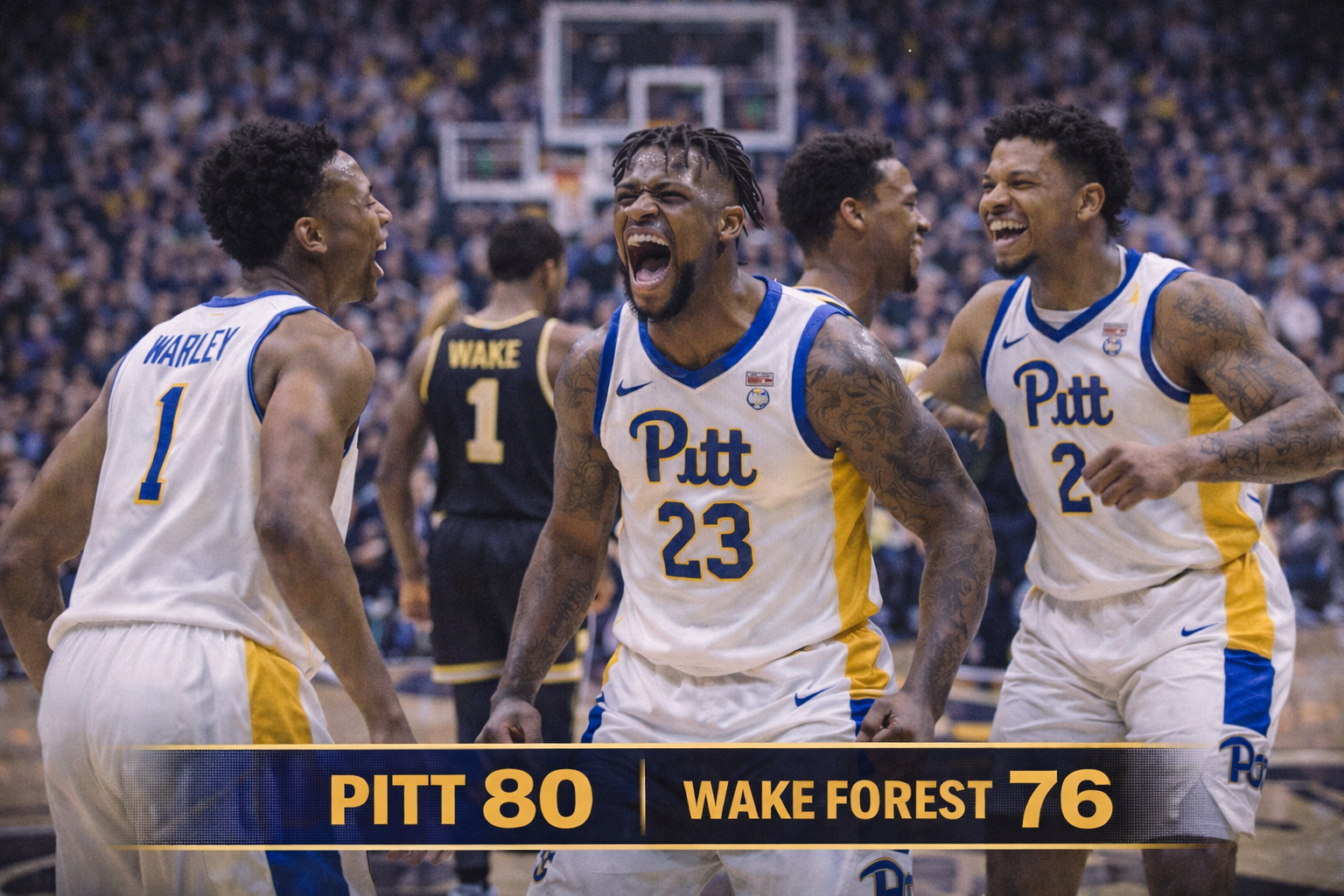
PITTSBURGH — Pitt spent most of Tuesday night chasing Wake Forest, then finished the game owning the biggest moments. Behind clutch late execution from freshman guard Omari Witherspoon and another dominant rebounding performance from Roman Siulepa, the Panthers rallied from a double-digit first-half deficit to defeat Wake Forest 80–76 in overtime at the Petersen Events Center. The win snapped Pitt’s three-game losing streak and delivered the Panthers their first ACC home victory of the season, improving them to 9–12 overall and 2–6 in conference play. Wake Forest fell to 11–10 (2–6 ACC), dropping its third straight game in a loss defined by missed late opportunities and costly second-chance breakdowns. Wake Forest Controls the First Half With Pace and Shot-Making Wake Forest controlled the opening stretch with pace and confident shot-making. Nate Calmese started the scoring with a floater as the shot clock expired, and the Demon Deacons built early momentum behind strong ball movement and interior finishes. Calmese drilled an early three as Wake Forest jumped out to a 7–0 lead, and the Deacs continued to press the advantage with clean half-court execution. As Wake settled into the game, the lead grew. A strong run pushed the margin to 23–11, and Wake Forest appeared in full control with multiple scorers contributing. Juke Harris attacked downhill for baskets at the rim and added a corner three late in the half, while Sebastian Akins provided scoring off the bench and helped Wake maintain its rhythm. The Demon Deacons entered halftime leading 36–30, with Harris pacing the offense. Pitt’s ability to stay within striking distance despite Wake’s strong first half came largely from Siulepa’s activity on the glass. He consistently extended possessions with offensive rebounds and kept the Panthers from falling into a hole too deep to escape. Even as Wake dictated tempo, Pitt’s physicality around the rim provided the foundation for a second-half push. Pitt Flips the Game After Halftime and Takes Control Briefly That push arrived immediately after the break. Pitt opened the second half with a quick burst, highlighted by a Brandin Cummings three and a dunk that trimmed the deficit to one. The Panthers played with more aggression, increased their pace, and began winning key rebounding sequences that had belonged to Wake earlier. With the game tightening, Pitt eventually claimed its largest lead of the night at 55–50 following a Nojus Indrusaitis three-pointer, signaling that the contest had fully flipped into a back-and-forth battle. Late Regulation Turns Into a Fight, Setting Up Overtime Drama Wake Forest responded with resilience. The Demon Deacons regained control late in regulation, taking a 66–62 lead with just over two minutes remaining. At that moment, Wake appeared poised to escape with a road win, but Pitt answered with urgency. Barry Dunning Jr. scored on a driving layup to cut the margin, then Siulepa produced one of the most pivotal sequences of the game, coming up with a steal and finishing with a thunderous dunk to tie it at 66–66 with just over a minute remaining. Neither team scored in the final minute of regulation, sending the game to overtime, where the drama escalated immediately. Witherspoon Delivers the Winning Shot as Pitt Closes the Door Pitt struck first in the extra session, as Siulepa hit a three to give the Panthers a 69–68 edge. The lead changed hands repeatedly, and the final period became a sequence of pressure possessions and timely answers. Wake Forest briefly looked like it had seized the win when Myles Colvin buried a three-pointer with just over two minutes left in overtime to put the Demon Deacons ahead 76–74. But Witherspoon responded with the defining moment of the night. After grabbing a defensive rebound and pushing the ball into the frontcourt, the freshman created space near the baseline and drilled a step-back jumper with 15 seconds remaining to give Pitt the lead. Wake still had a chance to answer, but Pitt executed the closing sequence with composure. Witherspoon was fouled with 6.7 seconds left and calmly knocked down both free throws to extend the lead to three. Roman Siulepa then picked off the inbounds pass, and Dunning was sent to the line, making one free throw to seal the 80–76 victory. Siulepa Powers Pitt’s Comeback With Rebounding and Toughness Pitt’s comeback was fueled by its dominance on the glass and its ability to convert Wake’s mistakes into points. The Panthers finished with a 42–37 rebounding advantage, including 16 offensive rebounds, which led directly to 20 second-chance points. Pitt also turned Wake Forest’s 13 turnovers into 17 points, swinging the possession battle in a game decided in overtime. Siulepa delivered another standout performance, finishing with 15 points and a game-high 15 rebounds, including eight offensive boards, recording his third straight double-double. Dunning added 15 points and nine rebounds, providing consistent interior scoring and finishing strength. Witherspoon scored 13 points to go along with four assists and two blocks, and his late scoring and free throws defined the closing minutes. Cummings also added 13 points, including three three-pointers and a critical overtime make that helped Pitt regain momentum during the final stretch. Wake Forest received balanced scoring, with Colvin leading the Demon Deacons with 18 points, fueled largely by his ability to get to the free-throw line. Harris added 17 points, while Calmese and Akins each scored 10. Cooper Schwieger pulled down a season-high 11 rebounds, and freshman Isaac Carr provided meaningful minutes with a career-high nine rebounds, helping Wake compete on the glass despite Pitt’s physicality. Final Takeaway In the end, the difference came down to late execution and extra possessions. Wake Forest played well enough to lead for much of the night, but Pitt’s rebounding, defensive pressure, and clutch shot-making turned the game in the Panthers’ favor when it mattered most. With the win, Pitt carries renewed momentum into its next challenge, while Wake Forest returns home searching for answers after another close loss that slipped away late.




